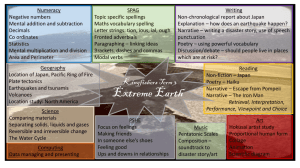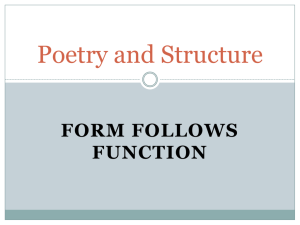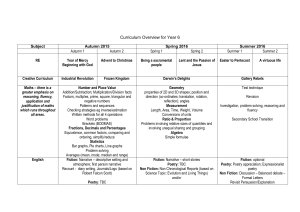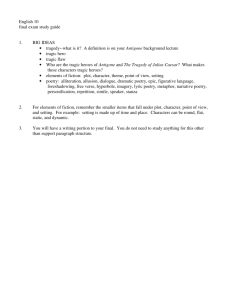R N C
advertisement
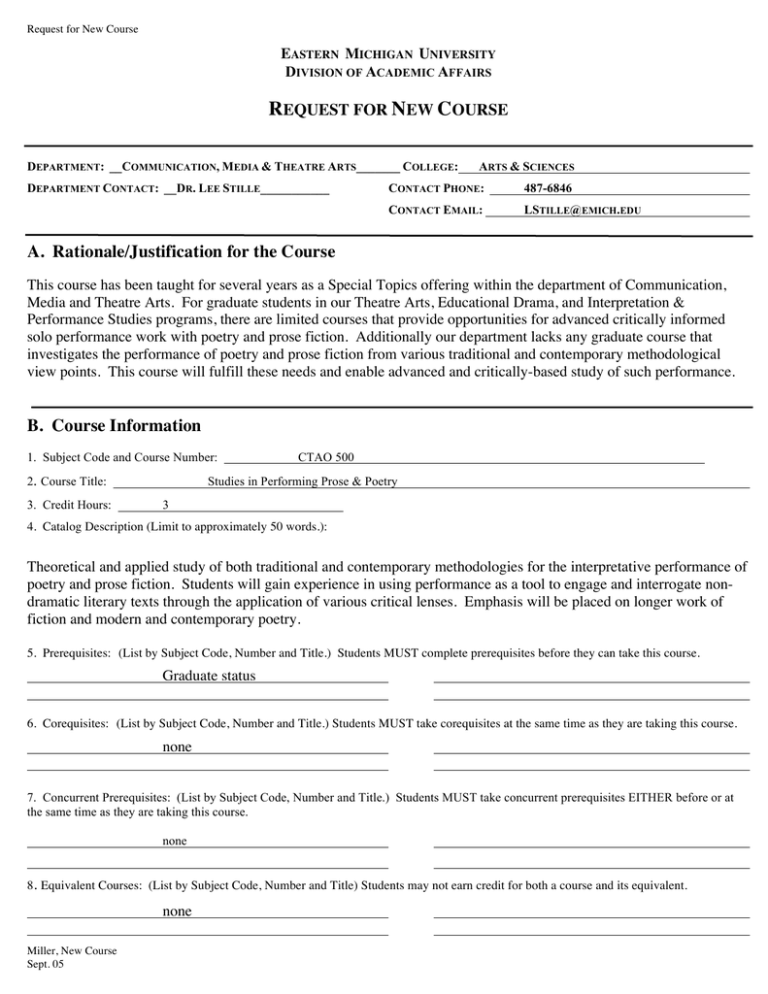
Request for New Course EASTERN MICHIGAN UNIVERSITY DIVISION OF ACADEMIC AFFAIRS REQUEST FOR NEW COURSE DEPARTMENT: __COMMUNICATION, MEDIA & THEATRE ARTS_______ COLLEGE: DEPARTMENT CONTACT: __DR. LEE STILLE___________ ARTS & SCIENCES CONTACT PHONE: 487-6846 CONTACT EMAIL: LSTILLE@EMICH.EDU A. Rationale/Justification for the Course This course has been taught for several years as a Special Topics offering within the department of Communication, Media and Theatre Arts. For graduate students in our Theatre Arts, Educational Drama, and Interpretation & Performance Studies programs, there are limited courses that provide opportunities for advanced critically informed solo performance work with poetry and prose fiction. Additionally our department lacks any graduate course that investigates the performance of poetry and prose fiction from various traditional and contemporary methodological view points. This course will fulfill these needs and enable advanced and critically-based study of such performance. B. Course Information 1. Subject Code and Course Number: 2. Course Title: 3. Credit Hours: CTAO 500 Studies in Performing Prose & Poetry 3 4. Catalog Description (Limit to approximately 50 words.): Theoretical and applied study of both traditional and contemporary methodologies for the interpretative performance of poetry and prose fiction. Students will gain experience in using performance as a tool to engage and interrogate nondramatic literary texts through the application of various critical lenses. Emphasis will be placed on longer work of fiction and modern and contemporary poetry. 5. Prerequisites: (List by Subject Code, Number and Title.) Students MUST complete prerequisites before they can take this course. Graduate status 6. Corequisites: (List by Subject Code, Number and Title.) Students MUST take corequisites at the same time as they are taking this course. none 7. Concurrent Prerequisites: (List by Subject Code, Number and Title.) Students MUST take concurrent prerequisites EITHER before or at the same time as they are taking this course. none 8. Equivalent Courses: (List by Subject Code, Number and Title) Students may not earn credit for both a course and its equivalent. none Miller, New Course Sept. 05 New Course Form 9. Course Restrictions: a. Academic/Class Level (Check all those who will be allowed to take the course for credit within their academic program.): Undergraduate Graduate Freshperson Certificate X Sophomore Masters X Junior Specialist X Senior Doctoral X Note: Only 400-level undergraduate courses can be taken by graduate students for credit within their graduate program. Only Certificate and Masters students may take these courses. If this is a 400-level course to be offered for graduate credit, attach Approval Form for 400-level Course for Graduate Credit. Note: Only 500-level graduate courses can be taken by undergraduate students. b. Will only students in certain majors/programs be allowed to take this course? Yes No X If yes, list the majors/programs c. Will Departmental Permission be Required? Yes No X (Note: Department permission requires the department to enter authorization for every student registering.) d. Is admission to a specific College Required? College of Business Yes No X College of Education Yes No X 10. Will the course be offered as part of the General Education Program? Yes No X If yes, attach Request for Inclusion of a Course in the General Education Program: Education for Participation in the Global Community form. Note: All new courses proposed for inclusion in this program will be reviewed by the General Education Advisory Committee. If this course is NOT approved for inclusion in the General Education program, will it still be offered? Yes No C. Relationship to Existing Courses Within the Department: 11. Will this course will be a requirement or restricted elective in any existing program(s)? Yes X No If yes, list the programs and attach a copy of the programs that clearly shows the place the new course will have in the curriculum. Program MA Theatre: Concentration in INPS Program 12. Will this course replace an existing course? Yes No Required Restricted Elective Required Restricted Elective X NOTE: Complete #13 only if the answer to #12 is “Yes.” Complete #14 only if the answers to #12 and #13b are both “Yes.” 13. (Complete only if the answer to #12 is “Yes.”) a. Subject Code, Number and Title of course to be replaced: Page 2 of 9 X New Course Form b. Will the course to be replaced be deleted? Yes No 14. (Complete only if the answers to #12 and #13b are both “Yes.”) If the replaced course is to be deleted, it is not necessary to submit a Request for Graduate and Undergraduate Course Deletion. a. When is the last time it will be offered? Term Year b. Is the course to be deleted required by programs in other departments? Contact the Course and Program Development Office if necessary. Yes No c. If yes, do the affected departments support this change? Yes No If yes, attach letters of support. If no, attach letters from the affected department explaining the lack of support, if available. Outside the Department: The following information must be provided. Contact the Course and Program Development office for assistance if necessary. 15. Are there similar courses offered in other University Departments? If yes, list courses by Subject Code, Number and Title Yes No X 16. If similar courses exist, do the departments in which they are offered support the proposed course? Yes No If yes, attach letters of support from the affected departments. If no, attach letters from the affected department explaining the lack of support, if available. D. Course Requirements 17. Attach a detailed Sample Course Syllabus including: a. b. c. d. e. f. g. h. Course goals, objectives and/or expected student outcomes Outline of the content to be covered Student assignments including presentations, research papers, exams, etc. Method of evaluation Grading scale (if a graduate course, include graduate grading scale) Special requirements Bibliography, supplemental reading list Other pertinent information. NOTE: COURSES BEING PROPOSED FOR INCLUSION IN THE EDUCATION FOR PARTICIPATION IN THE GLOBAL COMMUNITY PROGRAM MUST USE THE SYLLABUS TEMPLATE PROVIDED BY THE GENERAL EDUCATION ADVISORY COMMITTEE. THE TEMPLATE IS ATTACHED TO THE REQUEST FOR INCLUSION OF A COURSE IN THE GENERAL EDUCATION PROGRAM: EDUCATION FOR PARTICIPATION IN THE GLOBAL COMMUNITY FORM. E. Cost Analysis (Complete only if the course cannot be implemented without additional University resources. Fill in Estimated Resources for the sponsoring department(s). Attach separate estimates for other affected departments.) Estimated Resources: Year One Year Two Year Three Faculty / Staff $_________ $_________ $_________ SS&M $_________ $_________ $_________ Equipment $_________ $_________ $_________ Total $_________ $_________ $_________ Page 3 of 9 New Course Form F. Action of the Department/College 1. Department Vote of department faculty: For ____27______ Against _____0_____ (Enter the number of votes cast in each category.) Abstentions ___0_______ 2/7/13 Department Head Signature Date 2. College/Graduate School A. College College Dean Signature Date B. Graduate School Associate Dean Signature Date G. Approval Associate Vice-President for Undergraduate Studies and Curriculum Signature Date CTAO 500: Studies in Performing Prose & Poetry Course Syllabus Instructor: Dr. Lee Stille Office: 121 Quirk Building Office Phone: 487-­‐6846 (w/voicemail) E-­‐Mail: LStille@emich.edu Mailbox: 124 Quirk Office Hours: Text: COURSE PACK—includes excerpts from seminal and contemporary works: Campbell, Paul. TheSpeaking and the Speakers of Literature. Belmont, CA: Dickenson P, 1967. and Geiger, Don. The Sound, Sense, and Performance of Literature. Glenview, IL: Scott, Foresman and Co, 1963. Bentley, Phyllis. Some Observations on the Art of the Narrative. London: Home & Van Thal, 1946; and Thompson, David W. and Virginia Fredricks. Oral Interpretation of Fiction: A Dramatistic Approach. Minneapolis: Burgess P, 1967. Stern, Carol Simpson and Bruce Henderson. Performance: Text and Context. New York: Longman, 1993. Jaffe, Clella I. Performing Literary Texts: Concepts and Skills. Belmont, CA: Wadsworth, 2006. Astley, Ed Neil, ed. Staying Alive: Real Poems for Unreal Times. New York: Hyperion, 2003. Course Outcomes: Page 4 of 9 New Course Form Students will… Demonstrate awareness of what constitutes and distinguishes “poetic” and “narrative” expression. Comprehend the value of featuring point of view in the performance of narrative (and all other) texts. Evoke through performance the narrative languages of description, scene and summary. Activate the concepts of time, prosody and form within prose and poetry. Explore and engage the various aspects of imagery in the performance of poetry. Heighten sensitivity to the role of persona (and character) in performance. Determine and execute performance choices reflecting lyric, dramatic and narrative modes. Demonstrate advanced critical skills through intensive written and performance work with the poetry of a single published poet and/or modern (or contemporary) novel. Course Work: WRITTEN WORK: Various short papers relating to specific textual or performative concerns. Most are linked directly to your assigned performances. Handouts will be provided for all written assignments. Consider due dates “set in stone!”-­‐-­‐the nature of the writing assignments necessitate pre-­‐performance vs. post-­‐performance thinking. Late papers, being less useful to you, will not be accepted! All papers must be typewritten and of high quality. PERFORMANCE EMPHASIS: The course relies on both formal and exploratory (workshop) performances-­‐-­‐each with specific goals. Approximately four performances will be identified as EXPLORATORY and five as FORMAL. All assignments will be responded to critically. o Final Performance—Time Limit: 12-­‐15 minutes, including introduction and transitions. For this assignment, you may select from either of the following two options: OPTION 1: “The Novel” – Performance w/ Paper You are to select a novel and choose at least three passages from it to perform. These passages must come from different parts of the novel and not be exclusively sequential in the original. The excerpts you choose should explore some aspect of the novel. The element that you focus on becomes the theme/frame of your presentation. You may work with any facet of the novel you find fascinating, e.g., Comic Irony in John Kennedy Toole’s, A Confederacy of Dunces, Time in Kurt Vonnegut’s, Slaughterhouse Five, Characterization in Charles Dickens’ Great Expectations, The Concept of the Empty Woman in Joyce Carol Oates, Them, Violence in James Dickey’s, Deliverance, Performance as Lying in Thomas Mann’s Felix Krull. Paper: This formal paper should address the following topics in detail. Be sure to include examples from the novel that relate to the theme you are exploring. • Discussion of Presentation Theme (What is the theme? How is it manifested within the novel? How is it manifested within the chosen excerpts? Why are you exploring this theme? In what way does it provide us insight into the novel?) • Dramatistic Analysis of the Excerpts • What challenge(s) does this material pose for you? How do you plan to meet those challenges? OPTION 2: “The Poet” – Performance w/ Paper This performance/presentation should focus on the work and life of a single poet. You should provide us, the audience with an over-­‐view of the poet’s life as it affects his/her art; enough information regarding the words (including such things as major themes, major symbols, stylistic devices, unique characteristics) so that we can approach other works of the poet with some comprehension. Provide us as much insight as possible. This should not be viewed as a lecture, but as a creative act, a performative exploration of a poet and her/his works. Although you may be incorporating informative material, do it in an exciting, creative, aesthetically interesting way. You may use entire works or sections of poems. Paper: This formal paper should address the following topics and provide sufficient evidence to illustrate your ideas. Page 5 of 9 New Course Form • • • The Life of the Poet (biographical sketch, poet as person) Work of the Poet (description of major contribution, poet’s theory/definition of poetry, major themes, major symbols/metaphors, individualized usage (or patterns) of prosodic elements, unique characteristics) The Challenge to the Interpreter (What challenges does this pose for you/the interpreter? How will you meet that/those challenge(s)?) "Ground Rules" for the Course: o As this is a performance based course, participation is essential. Consider attendance mandatory. Active involvement (physical and mental) is expected every class period. Missed opportunities for engagement (this includes excessive tardiness) will be noted and will negatively influence your final grade. o All assigned work must be completed on the scheduled due date. This cannot be stressed enough! We have an intensely busy semester. It is your responsibility to know when you are scheduled to perform. No time will be available to make up performances. o Much class time will be devoted to performance. Be considerate! If you arrive late, listen outside the door before you enter. Never interrupt a classmate’s performance and always enter quietly so as to disturb the group. Also, please turn off all cell phones and other electronic devices. o No food or drink in class. o Academic dishonesty in any form will result in an E (failure) for the course. Grading: The grade you receive in this course will be based on the following division: Participation/Attitude/Effort/Growth 10% EXPLORATORY Performance Work 20% FORMAL Performance Work 40% Written Work (text analyses, poetic moment, notations, epic/lyric/dramatic paper, performance plans) 30% Schedule: (may be subject to change) Week 1 September 8 Orientation; Expectations; Assign: Read Campbell’s The Speaker and Speaking of Literature, Introduction & Chs 1-­‐5, and Jaffe’s Performing Literary Texts: Concepts & Skills—Ch 4; Assign: Read “novel” excerpts Week 2 13 Presentation: 2-­‐4 minute story 15 Discussion of Campbell; Assign: Speaker Assignment Week 3 20 FORMAL PERFORMANCE 1a: Preview/”In Defense of Persona” 22 FORMAL PERFORMANCE 1a: Preview/”In Defense of Persona” Week 4 27 FORMAL PERFORMANCE 1b: Speaker Presentation 29 FORMAL PERFORMANCE 1b: Speaker Presentation Week 5 Page 6 of 9 New Course Form October 4 Discussion: Summary (Scene), Scene (Role), Description (Gesture); Workshop on Description; Discuss notation for vocal choices; Assign: Locate Descriptive Passages-­‐-­‐approximately 2-­‐3 minutes long; Read: Bentley’s “Some Observations…”—p1-­‐33, and Thompson/Fredricks “Oral Interpretation of Fiction” —Chs 1-­‐3. 6 EXPLORATORY Performance 1: Vocal Dynamics; Assign: Read: Stern & Henderson’s “Performance: Texts and Contexts”—Chs 6-­‐12. Week 6 11 FORMAL PERFORMANCE 2: Performance of Description w/ Notation 13 FORMAL PERFORMANCE 2: Performance of Description w/ Notation Week 7 18 EXPLORATORY Performance 2: Dialogue; Assign: Locate 5 Images 20 EXPLORATORY Performance 2: Dialogue; Due: 5 Images—(include, image, title/author of poem, page # for each image); Assign: Read Geiger’s Sound, Sense, and the Performance of Literature—Ch 1-­‐4; Poetic Moment. Week 8 25 Due: Poetic Moment; Poetic Impulse and Modes; Assign: Locate Lyric, Epic, and Dramatic poems; Assign: Epic/Lyric/Dramatic Poems w/ Paper 27 Poetry Discussion/Sensory and Tonal Imagery Rhythm; Week 9 November 1 EXPLORATORY Performance 3: Rhythm and Texture; Epic/Lyric/Dramatic Poems w/Paper; Discuss: Final Performance 3 Submit & Discuss: Analysis for “The Image” assignment. Week 10 8 FORMAL PERFORMANCE 3: Performance “The Image” w/ Analysis 10 FORMAL PERFORMANCE 3: Performance “The Image” w/ Analysis Week 11 15 FORMAL PERFORMANCE 3: Performance “The Image” w/ Analysis; Discuss: Lyric Performance & Paper 17 Discuss Characteristics of the Ballad; Assign: EXPLORATORY Performance 4: The Ballad; Week 12 22 EXPLORATORY Performance 4: The Ballad 24 NO CLASS -­‐ Thanksgiving Recess Week 13 29 FORMAL PERFORMANCE 4: Lyric Poem Performance w/ Paper December 1 FORMAL PERFORMANCE 4: Lyric Poem Performance w/ Paper Week 14 6 Preparation for Final Performances 8 FORMAL PERFORMANCE 5: Final Performances w/ Paper Week 15 13 (1:30-­‐3:00) FORMAL PERFORMANCE 5: Final Performances w/ Paper BIBLIOGRAPHY Astley, Ed Neil, ed. Staying Alive: Real Poems for Unreal Times. New York: Hyperion, 2003. Print. Page 7 of 9 New Course Form Baldwin, Dean, and Patrick J. Quinn. An Anthology of Colonial and Postcolonial Short Fiction. Boston: Wadsworth Publishing, 2006. Print. Bell, Elizabeth. Theories of Performance. Thousand Oaks, CA: Sage Publications, 2008. Print. Bentley, Phyllis. Some Observations on the Art of the Narrative. London: Home & Van Thal, 1946. Print. Blair, Rhonda, ed. and Lutterbie, John, ed. “Cognitive Studies, Theatre, and Performance [special section].” Journal of Dramatic Theory and Criticism. 25.2 (2011): 63-­‐139. Print. Campbell, Paul. The Speaking and the Speakers of Literature. Belmont, CA: Dickenson Publishing, 1967. Print. Cook, Jon. Poetry in Theory: An Anthology 1900-­‐2000. Boston: Wiley-­‐Blackwell, 2004. Print. Dawson, Paul. “The Return of Omniscience in Contemporary Fiction.” Narrative. 17.2 (May): 143-­‐161. Print. Geiger, Don. The Sound, Sense, and Performance of Literature. Glenview, IL: Scott, Foresman and Company, 1958. Print. Gray, Paul, and James VanOosting. Performance in Life and Literature. Boston: Allyn and Bacon, 1996. Print. Grobe, Christopher. “The Breath of the Poem: Confessional Print/Performance circa 1959.” PMLA. 127.2 (2012): 215-­‐230, 423. JSTOR. Web. December 2012. Gura, Timothy, and Charlotte Lee. Oral Interpretation. 12 ed. New York: Pearson , 2009. Print. Harris, Mary Dee. “Analysis of the Discourse Structure of Lyric Poetry”. Computers and the Humanities. 23:4/5, Aug-­‐Oct 1989. 423-­‐428. JSTOR. Web. September 2004. Herman, David, James Phelan, Peter J. Rabinowitz, Brian Richardson, and Robyn R. Warhol. Narrative Theory: Core Concepts and Critical Debates. Columbus: Ohio State UP, 2012. Print. Hoffman, Michael J., ed. and Patrick D. Murphy, ed. Essentials of the Theory of Fiction. 3rd ed. Durham, NC, Duke UP, 2005. Print. Jaffe, Clella. Performing Literary Texts: Concepts and Skills. Boston: Wadsworth Publishing, 2005. Print. Kafalenos, Emma. Narrative Causalities. Columbus: Ohio State UP, 2006. Print. Kaminsky, Ilya, ed., and Susan Harris, ed. The Ecco Anthology of International Poetry. New York: Ecco, 2010. Print. Keleta-­‐Mae, Naila, “Outskirts to Mainstream? Performance Poetry on the Move. Canadian Theatre Review. 149 (2012): 76-­‐79. Print. Nielson, Lara. “Working the Field with Oral History: Talking Towards the Research Encounter in Theatre and Performance Studies. Journal of Dramatic Theory and Criticism 24.1 (2009): 99-­‐116. Print. Oates, Joyce Carol, ed. and Christopher R. Beha, ed. The Ecco Anthology of Contemporary American Short Fiction. New York: Harper Perennial, 2008. Print. Pelias, Ronald J., and Tracy Stephenson Shaffer, Performance Studies: The Interpretation of Aesthetic Texts. Dubuque, IA: Kendall Hunt Pub, 2007. Print. Page 8 of 9 New Course Form Petterson, Anders. The Concept of Literary Application: Readers’ Analogies from Text to Life. New York: Palgrave Macmillan, 2012. Print. Peterson, Eric E., and Langellier, Kristin M. “The Performance Turn in Narrative Studies.” Narrative Inquiry 16.1 (2006): 173-­‐180. Print. Poulin, A. and Michael Waters. Contemporary American Poetry. 8th ed. Boston: Wadsworth Publishing. 2005. Print. Roloff, Leland. The Perception and Evocation of Literature. Glenview, IL: Scott, Foresman and Company, 1973. Print. Stern, Carol Simpson, and Bruce Henderson. Learning to Perform: An Introduction. Evanston, IL: Northwestern UP, 2010. Print. -­‐-­‐-­‐. Performance: Text and Context. New York: Longman, 1993. Print. Strukus, Wanda. “Mining the Gap: Physically Integrated Performance and Kinesthetic Empathy. Journal of Dramatic Theory and Criticism 25.2 (2011): 89-­‐106. ProjectMUSE. Web. September 2012. Thompson, David W. and Virginia Fredricks. Oral Interpretation of Fiction: A Dramatistic Approach. Minneapolis: Burgess P, 1967. Print. Woodley, Krista. “Let the Data Sing: Representing Discourse in Poetic Form.” Journal of the Oral History Society. Vol 32, no 1, 2004. 49-­‐58. JSTOR. Web. November 2012. Yordon, Judy. Roles in Interpretation. 5th ed. Boston: McGraw-­‐Hill, 2001. Print. Page 9 of 9
